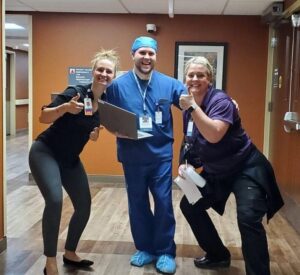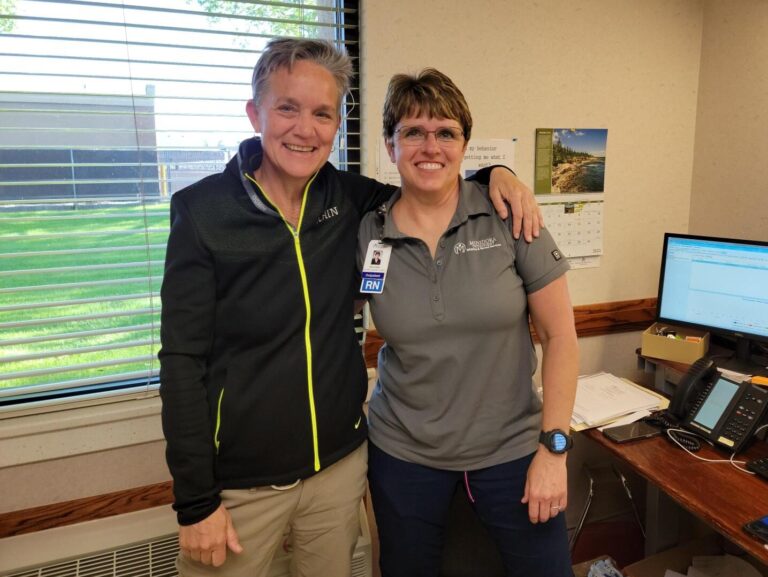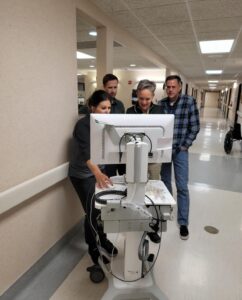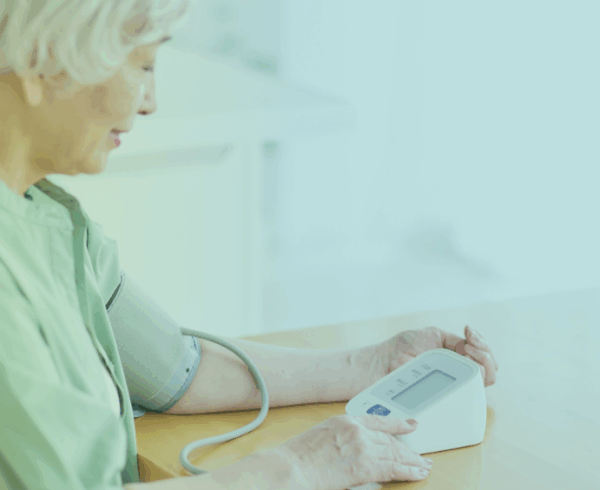September 5, 2023
Minidoka Memorial Hospital has always focused on being there when their community needs them the most. As a critical access hospital with an attached nursing home serving around 50,000 residents in southern Idaho, they have been the enduring heart of Minidoka County’s wellness and vitality for over 60 years.
As their old electronic health record (EHR) system was being discontinued, they began searching for a new EHR that would support their community’s needs in both the hospital and clinic settings. Because several local hospitals were already on Epic, they focused on how they could gain access to that platform of choice.
“More than half of our providers have had experience on Epic previous to coming here and were proponents of it … we knew it was a tried-and-true system and would be a huge accomplishment for our organization,” said Tom Murphy, CEO at Minidoka.
“OCHIN already had a significant number of rural health clinics and FQHCs that were already on Epic. They also had a national presence and professionalism … this is a company that has integrity. They do what they say they are going to do.”
In June 2023, Minidoka’s pioneering efforts helped them successfully adopt a new EHR platform. They went live on OCHIN Epic and became the first acute care member to join the OCHIN network, which has seamlessly supported federally qualified health centers and other ambulatory community clinics for more than 20 years. Partnering with OCHIN has enabled them to connect with an expanding system of care while retaining independence and the ability to meet the unique needs of their community.
“OCHIN stepped right up to the plate,” said Sara Zielinski, Chief Nursing Officer at Minidoka. “When it came to really narrowing down such a huge project to a critical access size, I would say that OCHIN really helped us see the bigger picture and connect the dots.”
Ensuring quality care for rural communities
 OCHIN empowers rural communities by enabling our network members with the tools and technology to reach patients wherever they are. Studies have found that people in rural areas are at higher risk for certain health issues. Rural areas also tend to have more older adults, and residents often face a variety of barriers that limit their ability to get the care they need, such as living in geographically isolated communities that are far from hospitals.
OCHIN empowers rural communities by enabling our network members with the tools and technology to reach patients wherever they are. Studies have found that people in rural areas are at higher risk for certain health issues. Rural areas also tend to have more older adults, and residents often face a variety of barriers that limit their ability to get the care they need, such as living in geographically isolated communities that are far from hospitals.
Rural hospitals like Minidoka help reduce these barriers by improving access to quality, affordable, community-based care. Located in the town of Rupert, Minidoka serves as an employer of choice for over 250 skilled professionals and supports around 6,000 patient visits per year. As one of only two hospitals in their rural agricultural community, they offer residents convenient access to surgery, inpatient and outpatient treatments, long-term care, emergency response ambulance, and occupational health.
“I am passionate about delivering as much care as possible that the community can support and that we can do safely,” Murphy said.
For example, many people who need orthopedic surgery are elderly and have a spouse or pet at home. Murphy says it’s a big deal to be able to perform the surgery in their community so the patient doesn’t have to travel. The patient’s partner can visit them but then go home and feed the dogs, have lunch in their house, and sleep in their own bed instead of having to get a hotel room and figure out who is going to take care of things when they’re gone.
“My folks are in their 80s, they do not want to drive to Boise or Salt Lake anymore … that is just so overwhelming for them. So to be able to provide those services … where they can stay in the comfort and security of their own community … that’s huge,” he said. “Also, some people can’t travel … and if they didn’t have access to care, they might suffer a severely depreciated quality of life, or they may perish from their condition. So having the ability for us to provide that care locally is both a convenience and a matter of life and death.”
Becoming part of the OCHIN network has allowed Minidoka to tailor their offerings to meet the needs and concerns of their rural community within their EHR. OCHIN helped Minidoka narrow down the platforms within Epic that would work best with their workflows in both hospital and rural health clinic settings, and digital tools like MyChart have increased access to virtual care. “We feel like it will be a huge win for our patients and our community as well, that they could have that kind of patient portal access,” Murphy said.
Keeping health care in the community

Despite their measurable and enduring value to the health of our nation, rural hospitals like Minidoka continue to face challenges such as ongoing financial uncertainty. Financial independence and self-determination are essential to ensure rural providers can continue to be reliable and trusted care providers.
“Our independence is a big part of our competitive advantage in that we do what we think is best suited to take care of our community,” Murphy said. “But it’s tough to make money as a small rural hospital.”
As a result, Minidoka considered becoming a hosted site on a larger hospital system’s Epic platform so they could gain access to a good electronic medical record system to survive the tough environment. But it wasn’t feasible to tailor the larger hospital system’s Epic instance to the operations of a small critical access hospital.
“As we reached out to other sites … they expressed difficulty getting the customization they needed and the support they needed from the larger facilities,” he said. “It also creates funny things as far as relationships and referrals. Are you beholden to that system because they’ve got your EMR and you’re sending patients to them, and if that relationship doesn’t stay healthy?”
When smaller rural hospitals join larger systems, they become part of the strategic plan that’s often developed in communities or states that aren’t anywhere near the hospital, Murphy said. “And sadly, they lose touch with what their community needs and wants from them as an organization.”
Minidoka also considered the consequences of partnering with a larger health system to access Epic, and then having to switch to a different EHR if that health system sold to another company.
“OCHIN is only in the business of extending Epic to clients like us,” Murphy said. “Being able to access a caliber of EMR like Epic through OCHIN to make it affordable will allow us to maintain our independence, will allow us to be competitive, and all those things can contribute to our financial stability in the long term. And that will help us continue to focus on strategic initiatives that serve our local community.”
Seamlessly connecting patient care
 Since most of the local hospitals where they refer patients for specialized care—whether out of the emergency room or clinic—also use Epic, Zielenski and Murphy have already seen the ability to exchange health records via Epic’s Care Everywhere interoperability platform as one of the greatest benefits for their community. Having “one patient, one record” ensures all health records flow seamlessly between patients and their many providers, giving clinicians greater insight into their patients’ health and helping to complete the circle of care in the community.
Since most of the local hospitals where they refer patients for specialized care—whether out of the emergency room or clinic—also use Epic, Zielenski and Murphy have already seen the ability to exchange health records via Epic’s Care Everywhere interoperability platform as one of the greatest benefits for their community. Having “one patient, one record” ensures all health records flow seamlessly between patients and their many providers, giving clinicians greater insight into their patients’ health and helping to complete the circle of care in the community.
“We had been on Epic a week and a half, and our ER medical director came up to me and said, ‘I just want to thank you for getting Epic, because it’s already benefitting myself and our patients,’” Murphy said.
A patient had come in with chest pain the day before, and within a few minutes, Minidoka’s ER physician was able to access his medical records from a neighboring provider through Care Everywhere so he could treat the patient more efficiently and effectively. The patient’s provider can also access the information Minidoka supplied to inform the patient’s care moving forward.
“Before, if the ER provider requested those records, it would have taken two hours for them to get them sent over, and he’d have to sort through a stack of papers to get the pertinent info that he needed for this patient,” Murphy said. “It connects everything for the patient, it’s going to save the patient time and money … it increases effectiveness, quality, treatment, follow-up … every way you look at that, that’s a better outcome for the patient and a better situation for the provider taking care of them.”
Partnering for a more resilient future
While there has been a learning curve, Zielinski says Minidoka’s partnership with OCHIN has made them stronger in the end. “Both our teams stepped up to the challenge, and I’m really happy with our partnership overall, our staff satisfaction, and our patient satisfaction.”
Murphy agrees. “This is the first EHR implementation where I haven’t had physicians pounding on my desk,” he said. “I have to give the OCHIN team kudos because everyone pulled together, and we had a fantastic implementation and go-live experience.”
He also looks forward to a long-term partnership with OCHIN. “Beyond my time here, OCHIN will be a partner with Minidoka,” he said. “I see this as the last EMR conversion we have to go through because we’ve got OCHIN with us.”











